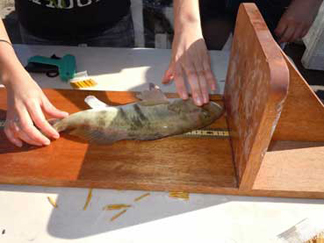
Sportfishers to Help Researchers
Study Marine Bass off San Diego
July
3, 2012
Contact:
Christina S. Johnson, csjohnson@ucsd.edu, 858-822-5334
SAN
DIEGO – The California Department of Fish and Game is proposing new limits on
recreational catches of three saltwater bass species to help populations
recover from decades of fishing and 14 years of mostly unfavorable oceanic
conditions.
A
new two-year collaborative fisheries project, to begin in July, will improve
what is known about these stocks, using tagging and recapture data collected by
volunteer anglers.
"We
are proposing limiting takes so that populations can rebound when oceanic
conditions become more favorable," said California Fish and Game marine
biologist Erica Jarvis, a co-investigator on the project, which is being funded
by Collaborative Fisheries West and the Ocean Protection Council and
administered by California Sea Grant. "The study will help the department
monitor the effectiveness of any regulatory change and will also help in
improving stock assessments for the species."
Brice
Semmens, an assistant professor at UCSD’s Scripps
Institution of Oceanography, is the project’s lead investigator with Ed
Parnell, an associate researcher, also at Scripps.
The
three species of interest are the kelp bass (Paralabrax
clathratus), barred sand bass (P. nebulifer) and spotted bay bass (P. maculatofasciatus). These species, particularly kelp
bass, also known as calico bass, are among the most popular sportfishes
in Southern California.
This
month, scientists will begin to charter “party boats” to take volunteers out
fishing at select sites between Dana Point in Orange County and Imperial Beach
in southern San Diego County. Some of the sampling areas will be inside the new
South Coast marine protected areas (MPAs). Anglers will catch, tag and release
fish, and record key information such as fish size, the gear used to catch the
fish, and whether a fish is suffering from barotrauma
(pressure-induced injury). Some fish will be released into pens to document
mortality rates from catch-and-release practices.
The
San Diego Oceans Foundation, a collaborator on the project, pilot tested a
tagging program in February at the San Diego Anglers’ Open Bay Bass Tournament.
About 400 bass were tagged and then transferred to a tank, where they were held
for a week to document mortalities from being brought up from depth and
handled. All the fish survived and were released.
The
new research grant will provide continued support for tagging fish at sportfishing
tournaments. Anglers next year – it is hoped – will not only tag new fish but
also capture ones tagged the year prior.
"These
are the fish people catch the most at the tournaments," said John
Valencia, executive director of San Diego Oceans Foundation. "It is easy
to tag fish when you have them in your hands. We are helping Fish and Game get
real science data, and we are doing it collaboratively with sportfishermen."
In
addition to collecting data via sport tournaments and chartered party boats,
private boat owners will also help scientists catch and tag the one species
that is normally not caught in coastal waters, the spotted bay bass, in San
Diego Bay and Mission Bay.
In
addition to these tag-and-recapture programs, 50 barred sand bass will be caught
at a known spawning aggregation in the new South La Jolla Marine Reserve and
surgically implanted with acoustic tags. These fish will be tracked via a
deployed listening array for up to a year.
Ultimately,
the success of this project will hinge on the ability to educate and motivate
anglers to report found tags. A major focus of this project is thus to broadly
engage the recreational fishing community in the research – how it will work,
why it is needed and why it will ultimately benefit the sport fishery by
ensuring its long-term sustainability.
To
assist in this effort, researchers plan to develop a Smartphone app that
fishers can use to report recovered tags and upload photos. A website and
publicity via sportfishing associations will also help spread the word on the
project and why participation is of value.
Data
will be used to better understand fish movement patterns, including "spill
over" from MPAs, and to better estimate spawning biomasses and mortality
rates from predation, fishing and catch-and-release.
"I
really think that if we help get the science and data, we are that much better
off," said Dwayne Patenaude, charter master of
the San Diego Anglers Fishing Club, which hosts the Open Bay Bass Tournament
and is also a collaborator on the project. "We are trying to be proactive.
I want the mangers to see that the calico bass fishery is not in trouble. The
sand bass fishery is cyclical, and there is no issue with the bay bass."
"I
grew up in San Diego, fishing, diving and surfing," said Lyall Bellquist, a graduate
student at Scripps Institution of Oceanography, working on the project. "I
always thought that the fishermen and researchers should work together and be
as transparent as possible, because we are all working ultimately toward the
same goal. This grant is the perfect opportunity. I could not have designed a
better request for research, in terms of what I've wanted to do."
Other
collaborating organizations on the project include: American Sportfishing Association,
Fred Hall & Associates and Sportfishing Association of California.


 Advertising
Advertising